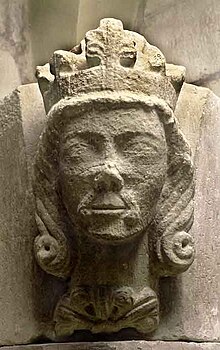Valdemar, King of Sweden
| Valdemar | |
|---|---|
 King Valdemar in Skara Cathedral[1] | |
| King of Sweden | |
| Reign | 1250–1275 |
| Predecessor | Erik XI |
| Successor | Magnus Ladulås |
| Born | 1239 |
| Died | 26 December 1302 (aged 62–63) |
| Spouse | Sophia of Denmark |
| Issue |
|
| House | House of Bjälbo |
| Father | Birger Jarl |
| Mother | Ingeborg Eriksdotter of Sweden |
Valdemar or Waldemar (Swedish: Valdemar Birgersson; 1239 – 26 December 1302) was King of Sweden from 1250 to 1275.
Biography
[edit]Valdemar was the son of the Swedish princess Ingeborg Eriksdotter and Birger Jarl, from the House of Bjälbo. When Ingeborg's brother King Eric XI died in 1250, though a child, Valdemar was elected king and crowned the following year in the cathedral at Linköping.[2] During the first sixteen years of Valdemar's reign, it was Birger Jarl who was the real ruler. Birger Jarl had been the de facto ruler of Sweden from 1248, before the reign of Valdemar, even under Eric XI. Valdemar's mother and King Eric XI were children of King Eric X and Richeza of Denmark.
After Birger's death in 1266 Valdemar eventually came into conflict with his younger brother Magnus Birgersson (later known as Magnus Ladulås), Duke of Södermanland, over taxation and personal matters.
In 1260, Valdemar married Sophia, the eldest daughter of King Eric IV of Denmark and Jutta of Saxony. Valdemar also had a relationship with his sister-in-law Jutta. In 1272, Princess Jutta visited Sweden and became Valdemar's mistress. The affair resulted in a child born in 1273. The following year, Jutta was placed in a convent and Valdemar was forced to make a pilgrimage to Rome to ask for the absolution of the Pope.
Valdemar was deposed by his brother Magnus after the Battle of Hova in Tiveden on 14 June 1275. Magnus was supported by his brother Eric Birgersson, Duke of Småland, and King Eric V of Denmark, who provided Danish soldiers. Magnus was elected King of Sweden at the Stones of Mora.
In 1277, Sophia separated from her spouse and returned to Denmark. That year, Valdemar managed to regain provinces in Gothenland in the southern part of the kingdom and was called the Duke of Götaland. However, Magnus regained them about 1278. In 1288 Valdemar was imprisoned by King Magnus in Nyköping Castle (Nyköpingshus) and lived openly with mistresses, possibly new wives, in comfortable confinement.[citation needed]
Family
[edit]Valdemar married Sofia of Denmark (died 1286) in 1260 and they separated in 1277. After their separation, Valdemar is said to have married multiple times. He had six children:[3]
- Ingeborg, Countess of Holstein; spouse of Gerhard II, Count of Holstein-Plön.
- Erik (1272–1330), riksråd of Sweden and Norway
- Marina (fl. 1285); spouse of Rudolf II, Lord of Diepholz (married 1285)
- Rikissa (Richeza; died c. 1292); spouse of Przemysł II of Poland
- Katarina (died 1283)
- Margareta, abbess at Skänninge convent.[4]
References
[edit]- ^ Svanberg, Jan (1987). Furstebilder från Folkungatid (in Swedish). Skara: Skaraborgs länsmuseum. pp. 110–128. ISBN 91-85884-52-9.
- ^ Chisholm, Hugh, ed. (1911). . Encyclopædia Britannica. Vol. 16 (11th ed.). Cambridge University Press. p. 730.
- ^ Lagerqvist, Lars O. (1995). Kings and rulers of Sweden : a pocket encyclopedia. Internet Archive. Stockholm, Sweden : Vincent Publications. p. 22. ISBN 978-91-87064-15-9.
- ^ Stålberg, Wilhelmina (1864). Anteckningar om svenska qvinnor (in Swedish). Stockholm: P.G. Berg. Retrieved 24 August 2024.
Bibliography
[edit]- Adolfsson, Mats När borgarna brann - svenska uppror (Stockholm: Natur & Kultur, 2007)
- Kyhlberg, Ola Gånget ut min hand (Riddarholmskyrkans stiftargravar Kungl. Vitterhets Historie och Antikvitets Akademien, Stockholm: 1997)
- Larsson, Mats G. Götarnas Riken : Upptäcktsfärder Till Sveriges Enande (Bokförlaget Atlantis AB. 2002) ISBN 978-91-7486-641-4
- Schück, Herman Kyrka och rike - från folkungatid till vasatid (Stockholm: 2005)
External links
[edit] Media related to Waldemar (Swedish king) at Wikimedia Commons
Media related to Waldemar (Swedish king) at Wikimedia Commons
